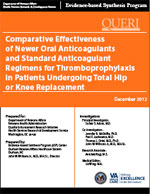
|
Principal Investigator:
Soheir S. Adam, M.D. VA Evidence-based Synthesis Program (ESP) Center Center for Chronic Disease Outcomes Research Durham Veterans Affairs Healthcare System Washington (DC): Department of Veterans Affairs; December 2012. |
Download PDF: Complete Report, Executive Summary, Report, Appendices
Venous thromboembolic (VTE) events are important causes of morbidity in elective total hip replacement (THR) and total knee replacement (TKR) procedures. Current guidelines recommend thromboprophylaxis in patients undergoing THR or TKR, although the American Academy of Orthopaedic Surgeons (AAOS) guidelines suggest individual assessment of patients when choosing the specific thromboprophylaxis strategy. Low molecular weight heparin (LMWH) and adjusted-dose warfarin are the most commonly used anticoagulants for thromboprophylaxis in the United States, but a number of other treatment options are available, including unfractionated heparin, aspirin, mechanical devices, and newer oral anticoagulants.
Prior to 1980, rates of symptomatic VTE were 15 to 30 percent. However, improved surgical care and techniques have decreased the rate of symptomatic VTE. A recent analysis that incorporated data from trials and observational studies estimated the contemporary 35-day rate of symptomatic VTE without thromboprophylaxis at 4.3 percent.
Pharmacological thromboprophylaxis for THR or TKR surgery decreases VTE by approximately 50 percent but with the tradeoff of increased bleeding. The risk of bleeding is a concern because bleeding can lead to infections, reoperation, delayed wound healing, and extended hospital stay. The choice of which antithrombotic thus becomes pivotal for balancing the prevention of thromboembolism with the risk of bleeding. Newer oral anticoagulants have been developed with the goal of overcoming the limitations of warfarin and the available parenteral agents. These newer anticoagulants belong to two drug classes, based on their target coagulation protein: factor Xa (FXa) inhibitors and direct thrombin inhibitors (DTIs). These drugs are given as fixed oral doses and have the advantage of a more predictable anticoagulant effect, eliminating the need for monitoring when used for short-term thromboprophylaxis. Disadvantages of newer oral anticoagulants include the lack of specific antidotes to reverse their anticoagulant effect in a timely fashion in case of bleeding, and drug costs.
Given the emerging data on new oral anticoagulants, this report was commissioned by the VA to examine the following key questions (KQs):